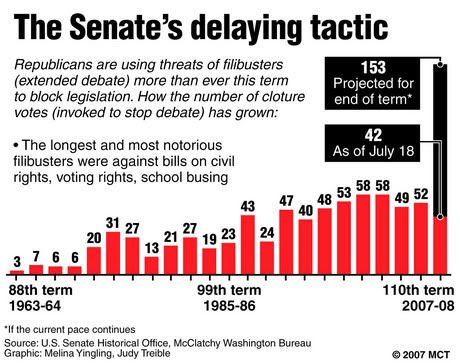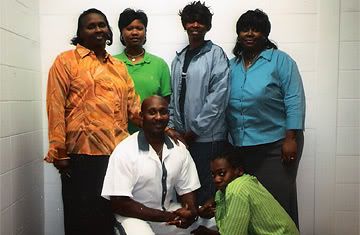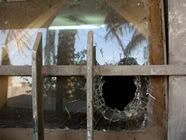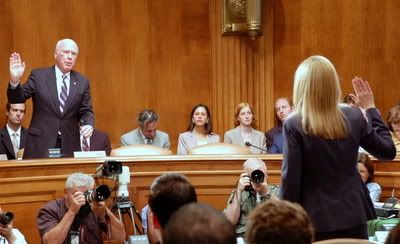
For the second time ever, and after leaking an advance copy to the
Associated Press, Bush-Cheney are releasing a 'declassified version' of the latest National Intelligence Estimate. It describes a "persistent and evolving" threat from al-Qaida over the next three years as the terrorist organization uses its enhanced power in Iraq to plot a possible attack on U.S. soil.
The last time the Bush-Cheney administration leaked an NIE, it was "selective"; only the parts that bolstered the administration's claims, and none of what called their claims into question.
This
partial NIE is even less informative, containing nothing new, just more of the same rhetoric of fear. It is the stuff of Michael Chertoff's 'gut.'
According to AP, which has obtained an advance copy of the NIE, "the report makes clear that al-Qaida in Iraq, which has not yet posed a direct threat to U.S. soil, could become a problem here."
"
Could become."
With enough bleach and plastic surgery, I
could become a blonde with big breasts.
I do have to hand it to Bush-Cheney-Rove, though, for their breathtakingly colossal chutzpah. Normal, mentally fit, decent leaders would be mortified by this report and realize it's an indictment of their administration's failed policies.
After six years, BushCo hasn't lost its ability or will to try to spin negatives into positives. To release this NIE as an exhibit in BushCo's latest campaign to thwart efforts to change course and bring the troops out of Iraq, when it's the best evidence of how the U.S. occupation of Iraq is making worldwide terrorism worse, is no question about it,
brass without equal.
BushCo has been given a blank check to do anything and everything it wanted to do to wage a "war on terror" (and what Bush-Cheney weren't given, they just took). We're back to 9/10/01. Trillions of dollars spent and committed long into the future, money which was supposed to go towards making us safer, but actually went into BushCo's pockets (their friends' and patrons' corporations) through privatization schemes. Our Constitutional rights, protections and guarantees are in shreds, and we're bigger targets, more exposed and vulnerable, and hated by many more throughout the world.
But is that what Bush-Cheney-Rove
and the Republicans who are still firmly behind them see when they read this NIE? Is their response, "My
bad, we blew it, let's change direction"? No. Their plan is "More of the same," more war (Iran), more legislation (they're now trying to tie their immigration reform legislation as "necessary to fight the war on terror"),
"...and put a little hustle in it."I hate to be a spoilsport, but when you live in Bush-Cheneyville long enough, it becomes second nature. Given the Bush-Cheney track record for lies and incompetence (blaming Al Qaeda and terrorism on Clinton first, and U.S. intelligence agencies second), and Congress's failure to do the work of oversight, I want to know what these "new and improved" intelligence agencies know and how they know it. A redacted NIE isn't going to cut it.
But, here it is, the
NIE entitled,
"Terrorist Threat To The U.S. Homeland," or, more accurately,
"From The Desk of Cheney|Bush: "Be Afraid, Be Very Afraid...Don't Make Us Have To Set Another 9/11 in Motion":
The Terrorist Threat to the US Homeland
July 2007
OFFICE OF THE DIRECTOR OF NATIONAL INTELLIGENCE
The Director of National Intelligence serves as the head of the Intelligence Community (IC), overseeing and directing the implementation of the National Intelligence Program and acting as the principal advisor to the President, the National Security Council, and the Homeland Security Council for intelligence matters.
The Office of the Director of National Intelligence is charged with:
• Integrating the domestic and foreign dimensions of US intelligence so that there are no gaps in our understanding of threats to our national security;
• Bringing more depth and accuracy to intelligence analysis; and
• Ensuring that US intelligence resources generate future capabilities as well as present results.
NATIONAL INTELLIGENCE COUNCIL
Since its formation in 1973, the National Intelligence Council (NIC) has served as a bridge between the intelligence and policy communities, a source of deep substantive expertise on critical national security issues, and as a focal point for Intelligence Community collaboration. The NIC's key goal is to provide policymakers with the best, unvarnished, and unbiased information. Its primary functions are to:
• Support the DNI in his role as Principal Intelligence Advisor to the President and other senior policymakers.
• Lead the Intelligence Community's effort to produce National Intelligence Estimates (NIEs) and other NIC products that address key national security concerns.
• Provide a focal point for policymakers, warfighters, and Congressional leaders to task the Intelligence Community for answers to important questions.
• Reach out to nongovernment experts in academia and the private sector—and use alternative analyses and new analytic tools—to broaden and deepen the Intelligence Community's perspective.
NIEs are the DNI's most authoritative written judgments concerning national security issues. They contain the coordinated judgments of the Intelligence Community regarding the likely course of future events.
NATIONAL INTELLIGENCE ESTIMATES AND THE NIE PROCESS
National Intelligence Estimates (NIEs) are the Intelligence Community’s (IC) most authoritative written judgments on national security issues and designed to help US civilian and military leaders develop policies to protect US national security interests. NIEs usually provide information on the current state of play but are primarily “estimative”—that is, they make judgments about the likely course of future events and identify the implications for US policy.
The NIEs are typically requested by senior civilian and military policymakers, Congressional leaders and at times are initiated by the National Intelligence Council (NIC). Before a NIE is drafted, the relevant National Intelligence Officer is responsible for producing a concept paper, or terms of reference (TOR), and circulates it throughout the Intelligence Community for comment. The TOR defines the key estimative questions, determines drafting responsibilities, and sets the drafting and publication schedule. One or more IC analysts are usually assigned to produce the initial text. The NIC then meets to critique the draft before it is circulated to the broader IC. Representatives from the relevant IC agencies meet to hone and coordinate line-by-line the full text of the NIE. Working with their Agencies, representatives also assign the level of confidence they have in key judgments. IC representatives discuss the quality of sources with collectors, and the National Clandestine Service vets the sources used to ensure the draft does not include any that have been recalled or otherwise seriously questioned.
All NIEs are reviewed by National Intelligence Board, which is chaired by the DNI and is composed of the heads of relevant IC agencies. Once approved by the NIB, NIEs are briefed to the President and senior policymakers. The whole process of producing NIEs normally takes at least several months.
The NIC has undertaken a number of steps to improve the NIE process under the DNI. These steps are in accordance with the goals and recommendations set out in the Senate Select Committee on Intelligence and WMD Commission reports and the 2004 Intelligence Reform and Prevention of Terrorism Act. Most notably, over the last two years the IC has:
• Created new procedures to integrate formal reviews of source reporting and technical judgments. The Director of CIA, as the National HUMINT Manager, as well as the Directors of NSA, NGA, and DIA and the Assistant Secretary/INR are now required to submit formal assessments that highlight the strengths, weaknesses, and overall credibility of their sources used in developing the critical judgments of the NIE.
• Applied more rigorous standards. A textbox is incorporated into all NIEs that explains what we mean by such terms as “we judge” and that clarifies the difference between judgments of likelihood and confidence levels. We have made a concerted effort to not only highlight differences among agencies but to explain the reasons for such differences and to display them prominently in the Key Judgments.
THE US HOMELAND THREAT ESTIMATE: HOW IT WAS PRODUCED
The Estimate, Terrorist Threats to the US Homeland, followed the standard process for producing National Intelligence Estimates (NIEs), including a thorough review of sourcing, in-depth Community coordination, the use of alternative analysis, and review by outside experts. Starting in October 2006, the NIC organized a series of roundtables with IC experts to scope out terms of reference (TOR) for the Estimate. Drafters from throughout the Community contributed to the draft. In May, a draft was submitted to IC officers in advance of a series of coordination meetings that spanned several days. The National Clandestine Service, FBI, and other IC collection officers reviewed the text for the reliability and proper use of the sourcing. As part of the normal coordination process, analysts had the opportunity--and were encouraged--to register “dissents” and provide alternative analysis. Reactions by the two outside experts who read the final product were highlighted in the text. The National Intelligence Board, composed of the heads of the 16 IC agencies and chaired by the ODNI, reviewed and approved the Estimate on 21 June. As with other NIEs, it is being distributed to senior Administration officials and Members of Congress.
What We Mean When We Say: An Explanation of Estimative Language
When we use words such as “we judge” or “we assess”—terms we use synonymously—as well as “we estimate,” “likely” or “indicate,” we are trying to convey an analytical assessment or judgment. These assessments, which are based on incomplete or at times fragmentary information are not a fact, proof, or knowledge. Some analytical judgments are based directly on collected information; others rest on previous judgments, which serve as building blocks. In either type of judgment, we do not have “evidence” that shows something to be a fact or that definitively links two items or issues.
Intelligence judgments pertaining to likelihood are intended to reflect the Community’s sense of the probability of a development or event. Assigning precise numerical ratings to such judgments would imply more rigor than we intend. The chart below provides a rough idea of the relationship of terms to each other.
We do not intend the term “unlikely” to imply an event will not happen. We use “probably” and “likely” to indicate there is a greater than even chance. We use words such as “we cannot dismiss,” “we cannot rule out,” and “we cannot discount” to reflect an unlikely—or even remote—event whose consequences are such it warrants mentioning. Words such as “may be” and “suggest” are used to reflect situations in which we are unable to assess the likelihood generally because relevant information is nonexistent, sketchy, or fragmented.
In addition to using words within a judgment to convey degrees of likelihood, we also ascribe “high,” “moderate,” or “low” confidence levels based on the scope and quality of information supporting our judgments.
• “High confidence” generally indicates our judgments are based on high-quality information and/or the nature of the issue makes it possible to render a solid judgment.
• “Moderate confidence” generally means the information is interpreted in various ways, we have alternative views, or the information is credible and plausible but not corroborated sufficiently to warrant a higher level of confidence.
• “Low confidence” generally means the information is scant, questionable, or very fragmented and it is difficult to make solid analytic inferences, or we have significant concerns or problems with the sources.
Key Judgments
We judge the US Homeland will face a persistent and evolving terrorist threat over the next three years. The main threat comes from Islamic terrorist groups and cells, especially al-Qa’ida, driven by their undiminished intent to attack the Homeland and a continued effort by these terrorist groups to adapt and improve their capabilities.
We assess that greatly increased worldwide counterterrorism efforts over the past five years have constrained the ability of al-Qa’ida to attack the US Homeland again and have led terrorist groups to perceive the Homeland as a harder target to strike than on 9/11. These measures have helped disrupt known plots against the United States since 9/11.
• We are concerned, however, that this level of international cooperation may wane as 9/11 becomes a more distant memory and perceptions of the threat diverge.
Al-Qa’ida is and will remain the most serious terrorist threat to the Homeland, as its central leadership continues to plan high-impact plots, while pushing others in extremist Sunni communities to mimic its efforts and to supplement its capabilities. We assess the group has protected or regenerated key elements of its Homeland attack capability, including: a safehaven in the Pakistan Federally Administered Tribal Areas (FATA), operational lieutenants, and its top leadership. Although we have discovered only a handful of individuals in the United States with ties to al-Qa'ida senior leadership since 9/11, we judge that al-Qa’ida will intensify its efforts to put operatives here.
• As a result, we judge that the United States currently is in a heightened threat environment.
We assess that al-Qa’ida will continue to enhance its capabilities to attack the Homeland through greater cooperation with regional terrorist groups. Of note, we assess that al-Qa’ida will probably seek to leverage the contacts and capabilities of al-Qa’ida in Iraq (AQI), its most visible and capable affiliate and the only one known to have expressed a desire to attack the Homeland. In addition, we assess that its association with AQI helps al-Qa’ida to energize the broader Sunni extremist community, raise resources, and to recruit and indoctrinate operatives, including for Homeland attacks.
We assess that al-Qa’ida’s Homeland plotting is likely to continue to focus on prominent political, economic, and infrastructure targets with the goal of producing mass casualties, visually dramatic destruction, significant economic aftershocks, and/or fear among the US population. The group is proficient with conventional small arms and improvised explosive devices, and is innovative in creating new capabilities and overcoming security obstacles.
• We assess that al-Qa’ida will continue to try to acquire and employ chemical, biological, radiological, or nuclear material in attacks and would not hesitate to use them if it develops what it deems is sufficient capability.
We assess Lebanese Hizballah, which has conducted anti-US attacks outside the United States in the past, may be more likely to consider attacking the Homeland over the next three years if it perceives the United States as posing a direct threat to the group or Iran.
We assess that the spread of radical—especially Salafi—Internet sites, increasingly aggressive anti-US rhetoric and actions, and the growing number of radical, self-generating cells in Western countries indicate that the radical and violent segment of the West’s Muslim population is expanding, including in the United States. The arrest and prosecution by US law enforcement of a small number of violent Islamic extremists inside the United States— who are becoming more connected ideologically, virtually, and/or in a physical sense to the global extremist movement—points to the possibility that others may become sufficiently radicalized that they will view the use of violence here as legitimate. We assess that this internal Muslim terrorist threat is not likely to be as severe as it is in Europe, however.
We assess that other, non-Muslim terrorist groups—often referred to as “single-issue” groups by the FBI—probably will conduct attacks over the next three years given their violent histories, but we assess this violence is likely to be on a small scale.
We assess that globalization trends and recent technological advances will continue to enable even small numbers of alienated people to find and connect with one another, justify and intensify their anger, and mobilize resources to attack—all without requiring a centralized terrorist organization, training camp, or leader.
• The ability to detect broader and more diverse terrorist plotting in this environment will challenge current US defensive efforts and the tools we use to detect and disrupt plots. It will also require greater understanding of how suspect activities at the local level relate to strategic threat information and how best to identify indicators of terrorist activity in the midst of legitimate interactions.









